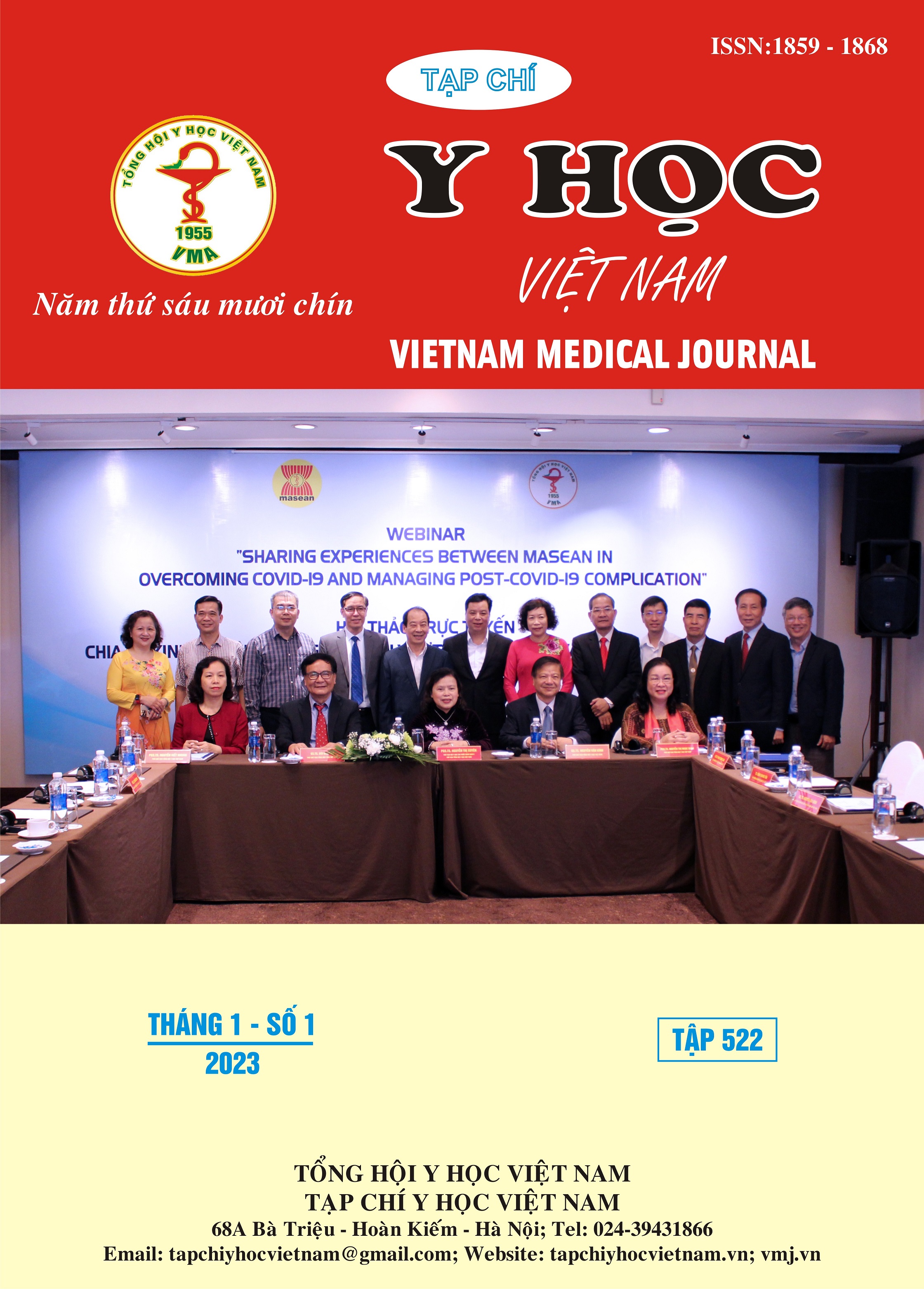RESULTS OF LAPAROSCOPIC SURGERY FOR RECTAL CANCER AT HANOI MEDICAL UNIVERSITY HOSPITAL, 2016-2020
Main Article Content
Abstract
Objective: To evaluate the results of laparoscopic surgery for rectal cancer at Hanoi Medical University Hospital. Subjects and methods: a retrospective descriptive study with longitudinal follow-up on 69 patients diagnosed with rectal cancer undergoing laparoscopic surgery at Hanoi Medical University Hospital between 2016 and 2020. Results: Patients in stage III accounted for the largest proportion with 58%. There were 36.2% of patients applied rectal resection method, low anastomosis; 30.4% of patients were applied rectal resection method, high anastomosis. Miles surgery accounted for 11.6%. The mean surgical time was 140.2 ± 30.6. The number of cases of complications was 5 cases, accounting for 7.2%. The mean follow-up time was 38.9 months, the mortality rate was 13%. The recurrence rate was 17.4%. The mean disease-free survival time was 60.9 ± 2.9 months. The 5-year disease-free survival rate was 82.6%. The mean overall survival was 62.7 ± 2.8 months. The 5-year overall survival rate is 87%. Multivariate analysis showed that tumor invasiveness and CEA levels were independent prognostic factors for disease-free survival, tumor invasiveness was independent prognostic factors for survival. remaining whole. Conclusion: With the short-term and long-term results achieved, laparoscopic surgery for rectal cancer can continue to be performed if the patient's conditions are favorable and the surgeon is experienced.
Article Details
Keywords
rectal cancer, laparoscopic surgery, Hanoi Medical University Hospital
References
2. Hà Văn Quyết, Phạm Đức Huấn, Trần Bình Giang. Kết quả bước đầu áp dụng phẫu thuật nội soi trong điều trị ung thư đại trực tràng. Kỷ Ếu Tóm Tắt Các Đề Tài Khoa Học Đại Hội Hội Ngoại Khoa Việt Nam Lần Thứ XI. Published online 2004:36-37.
3. Bonjer HJ, Deijen CL, Abis GA, et al. A Randomized Trial of Laparoscopic versus Open Surgery for Rectal Cancer. N Engl J Med. 2015; 372(14):1324-1332. doi:10.1056/NEJMoa1414882
4. Patankar SK, Larach SW, Ferrara A, et al. Prospective comparison of laparoscopic vs. open resections for colorectal adenocarcinoma over a ten-year period. Dis Colon Rectum. 2003; 46(5):601-611. doi:10.1007/s10350-004-6616-z
5. Pocard M, Zinzindohoue F, Haab F, Caplin S, Parc R, Tiret E. A prospective study of sexual and urinary function before and after total mesorectal excision with autonomic nerve preservation for rectal cancer. Surgery. 2002;131(4):368-372. doi:10.1067/msy.2002.122371
6. Trần Hữu Minh (2020). Đánh giá kết quả phẫu thuật nội soi ung thư trực tràng tại Bệnh viện Bạch Mai. Luận văn Bác sĩ chuyên khoa II, Trường Đại học Y Hà Nội, Hà Nội.
7. Nguyễn Thế Bắc (2021). Đánh giá kết quả phẫu thuật nội soi điều trị ung thư biểu mô trực tràng tại Bệnh viện Việt Đức. Luận văn Thạc sĩ Y học. Trường Đại học Y Hà Nội. Hà Nội.
8. Quách Văn Kiên (2019). Nghiên cứu ứng dụng phẫu thuật nội soi bảo tồn cơ thắt trong ung thư trực tràng giữa và dưới. Luận án Tiến sĩ Y học. Trường Đại học Y Hà Nội. Hà Nội.
9. Laurent C, Rullier E. La résection intersphinctérienne du rectum. J Chir (Paris). 2007;144(3):225-230. doi:10.1016/S0021-7697(07) 89520-2
10. Fleshman J, Branda M, Sargent DJ, et al. Effect of Laparoscopic-Assisted Resection vs Open Resection of Stage II or III Rectal Cancer on Pathologic Outcomes. JAMA. 2015;314(13):1346-1355. doi:10.1001/jama.2015.10529


